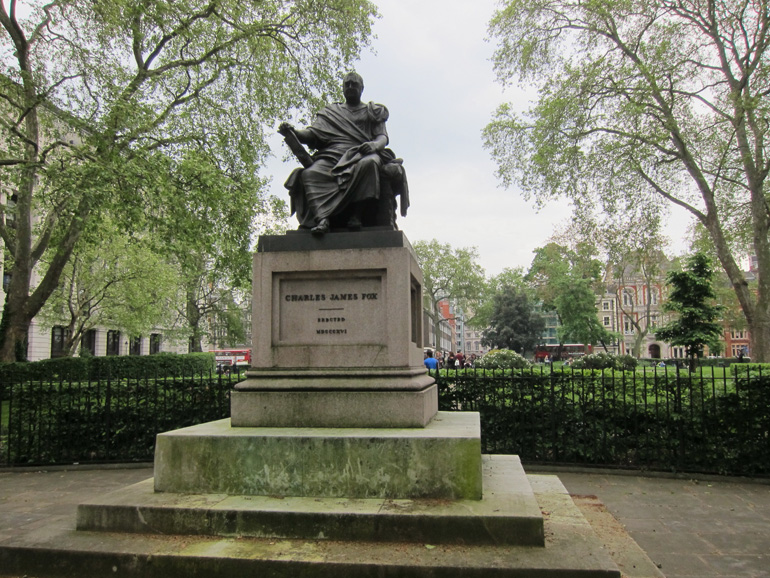Beachcombing:
One Hundred Years Too Soon
June 2012
Saturday, June 30th, 2012
¶ James Baldwin’s letter to his fifteen year-old nephew (also James Baldwin) no longer seems as bitter as it might have done when written; the shock of Baldwin’s message has completely worn away, and we are left with the simple truth of what he says, which is, alas, still with us — check out “stop and frisk” on Google if you have doubts. (Letters of Note)
I said that it was intended that you should perish in the ghetto, perish by never being allowed to go behind the white man’s definitions, by never being allowed to spell your proper name. You have, and many of us have, defeated this intention; and, by a terrible law, a terrible paradox, those innocents who believed that your imprisonment made them safe are losing their grasp of reality. But these men are your brothers—your lost, younger brothers. And if the word integration means anything, this is what it means: that we, with love, shall force our brothers to see themselves as they are, to cease fleeing from reality and begin to change it.
¶ Proof that the legal system is seriously broken is offered in a series of entries at Popehat concerning a preposterous lawsuit against The Oatmeal. (Thanks, Megan!)
See, a legal threat like the one Charles Carreon sent — “shut up, delete your criticism of my client, give me $20,000, or I’ll file a federal lawsuit against you” — is unquestionably a form of bullying. It’s a form that’s endorsed by our broken legal system. Charles Carreon doesn’t have to speak the subtext, any more than the local lout has to tell the corner bodega-owner that “protection money” means “pay of we’ll trash your shop.” The message is plain to anyone who is at all familiar with the system, whether by experience or by cultural messages. What Charles Carreon’s letter conveyed was this: “It doesn’t matter if you’re in the right. It doesn’t matter if I’m in the wrong. It doesn’t matter that my client makes money off of traffic generated from its troglodytic users scraping content, and looks the other way with a smirk. It just doesn’t matter. Right often doesn’t prevail in our legal system. When it does, it is often ruinously expensive and unpleasant to secure. And on the way I will humiliate you, delve into private irrelevancies, harass your business associates and family, disrupt your sleep, stomp on your peace of mind, and consume huge precious swaths of your life. And, because the system is so bad at redressing frivolous lawsuits, I’ll get away with it even if I lose — which I won’t for years. Yield — stand and deliver — or suffer.”
Our system privileges Charles Carreon to issue that threat, rather than jailing or flogging him for it.
¶ No less screwed-up, in our view, is the idea that creative work posted on the Internet ought to be available without charge. Maria Bustillos and David Lowery (author of the “Letter to Emily“) discuss the possibility that legal arguments advanced by Lawrence Lessig and others have no foundation in the realities of excellence. (The Awl)
What this really is, is a simple political issue: a labor issue. It should be possible for a working musician to support a household without having to tour twelve months out of the year, just like it should be possible to live modestly on minimum wage (which it ain’t). But because “art” and “artists” are seen in our world less as craftsmen, and more like these special magical unicorns who are “compelled” to “make art” and can live on air, we are taking our eyes off the ball. Let’s agree on the obvious, and figure out how we can all be paid fairly for our work.
¶ Ian Hacking’s introduction to a new edition of Thomas Kuhn’s paradigm-shifting book, The Structure of Scientific Revolutions, appears at the Los Angeles Review of Books. Hacking notes that Kuhn was hostile to the development of “science studies,” a field of which his book more than any other factor caused explosive expansion. At issue, it seems, was truthiness. “Kuhn cannot take seriously that “there is some one full, objective, true account of nature.” Does this mean that he does not take truth seriously? Not at all.” ¶ Maria Popova’s appreciation of WIB Beveridge’s 1957 guide to The Art of Scientific Investigation suggests that this book ought to be as well-known as Kuhn’s. Beveridge certainly seems to have had an advance line on the Cognitive Revolution. (Brain Pickings)
It is not possible deliberately to create ideas or to control their creation. When a difficulty stimulates the mind, suggested solutions just automatically spring into the consciousness. The variety and quality of the suggestions are functions of how well prepared our mind is by past experience and education pertinent to the particular problem. What we can do deliberately is to prepare our minds in this way, voluntarily direct our thoughts to a certain problem, hold attention on that problem and appraise the various suggestions thrown up by the subconscious mind.
***
¶ Money — the problem with money — will always be with us. The worst of it is that, if money is not an end in itself (it can’t be), where should the pressure to acquire it let up? Robert Skidelsky and his son, Edward Skidelsky, explore the question in an essay, “In Praise of Leisure,” adapted from a forthcoming book. They find authority in that old fun-seeker, Bertrand Russell. (Chron Higher Ed; via Brainiac)Â
We cannot expect a society trained in the servile and mechanical uses of time to become one of free men overnight. But we should not doubt that the task is, in principle, possible. Bertrand Russell, in an essay written just two years after Keynes’s effort—a further illustration of the stimulating effects of economic crisis—put the point with his usual clarity:
“It will be said that, while a little leisure is pleasant, men would not know how to fill their days if they had only four hours of work out of the 24. Insofar as this is true in the modern world, it is a condemnation of our civilization; it would not have been true at any earlier period. There was formerly a capacity for lightheartedness and play which has been to some extent inhibited by the cult of efficiency. … The pleasures of urban populations have become mainly passive: seeing cinemas, watching football matches, listening to the radio, and so on. This results from the fact that their active energies are fully taken up with work; if they had more leisure, they would again enjoy pleasures in which they took an active part.”
¶ We can only imagine what Tyler Cowen, with the collapse of public trust at the forefront of his thinking, would make of the Skidelskys’ musings. “Politicians do not have enough trust that voters will reward them for being courageous, if that is the right word, and voters do not have enough trust that the political act is in fact one of courage.” (Marginal Revolution) ¶ Tyler’s observations make it difficult to see how to implement the spending program that Brad DeLong and Barry Eichengreen recommend urgently in their introduction to a new edition of Charles Kindleberger’s The World in Depression 1929-1939 (1973). ¶ It’s probably too late, anyway, suggests Michael Pettis, who asks “Will Globalization Go Bankrupt” at the thrillingly-titled site, Credit Writedowns. “The “Greenspan put†was once again exercised and the market bailed out, but as Hyman Minsky would probably have pointed out had he been alive, this would only ensure that the crisis, when it eventually came, would be worse.” ¶ We’re all going to hell in a handbasket, anyway, argues Chris Hayes in a new book, Twilight of the Elites, excerpted at The Nation. Oligarchy is inevitable!
Michels’s grim conclusion was that it was impossible for any party, no matter its belief system, to bring about democracy in practice. Oligarchy was inevitable. For any kind of institution with a democratic base to consolidate the legitimacy it needs to exist, it must have an organization that delegates tasks. The rank and file will not have the time, energy, wherewithal or inclination to participate in the many, often minute decisions necessary to keep the institution functioning. In fact, effectiveness, Michels argues convincingly, requires that these tasks be delegated to a small group of people with enough power to make decisions of consequence for the entire membership. Over time, this bureaucracy becomes a kind of permanent, full-time cadre of leadership. “Without wishing it,†Michels says, there grows up a great “gulf which divides the leaders from the masses.†The leaders now control the tools with which to manipulate the opinion of the masses and subvert the organization’s democratic process. “Thus the leaders, who were at first no more than the executive organs of the collective, will soon emancipate themselves from the mass and become independent of its control.â€
All this flows inexorably from the nature of organization itself, Michels concludes, and he calls it “The Iron Law of Oligarchyâ€: “It is organization which gives birth to the dominion of the elected over the electors, of the mandataries over the mandators, of the delegates over the delegators. Who says organization says oligarchy.â€
¶ So now we know why zombies are so big right now. But, argues Kristin Rawls at AlterNet (via The Millions),
It’s not zombies we have to fear. It’s the pervasiveness of the belief that extreme disparity is the natural state of things. It’s alarming that these attitudes persist without question or analysis amid media circuses that offer nothing but spectacle.
Zombies promise certain doom that we cannot possibly defeat. The promise of impending self-destruction, by contrast, offers us a shred of agency – that is, the slight possibility that we can fix this. And however small or unsatisfying this reminder may be, we can at least remember that we have a little more hope than, say, the characters who appear in “The Walking Dead.”
¶ Not so fast with the badmouthing of “media circuses”! The Wire star Wendell Pierce is using his ill-gotten (?) gains to irrigate food deserts in his native New Orleans. (GOOD)
***
¶ The most moving aspect of Jeremy Mesiano-Crookston’s collective interview with a handful of Trappist monks is the preoccupation with sin as an everyday, low-grade distraction from what’s important. It is quite as though these men have set up in a Colonial Williamsburg of the mind, one which catechism-defined souls still fall away from God. (The Awl). ¶ Richard Ford finds that, in Canada — the country, not his new novel — he feels released from “this fierce sense of American exigence.” (Guardian; via The Millions) ¶ At The Age of Uncertainty, Steerforth is careful to point out that, having grown up at Richmond, he is not a true Londoner. (We had the same feeling about growing up in Westchester.) But he highly recommends Craig Taylor’s collection of interviews with 200 Londoners.
¶ Felix Salmon goes straight to the heart of what’s useful about blogging (and what’s not) in his appraisal of the Jonah Lehrer kerfuffle. As Felix points out, you can be charged with plagiarizing yourself — repeating yourself is, in certain contexts (scientific ones, especially) tantamount to misrepresenting what you’re saying as new. So, instead of offering fascinating (but occasionally repetitive) magazine articles in blog format, Jonah ought to use Frontal Cortex as a notebook, for sketching ideas, noting links, and responding to commentary. Hard to put into practise, but a beacon to steer toward. ¶ In another vein altogether, Brian Platzer decides to put Imagine to the test, and faute de mieux pursues creativity with the aid of Dewar’s, and also with Red Bull and No-Doze, all in an attempt to resolve his desire to move to California. “My wife hugged me and called me an idiot in the way I liked.” I guess they’re staying in New York. (The Rumpus) ¶ Not surprisingly, David Edwards finds the atmosphere at a monastery/resort near Bordeaux more conducive to creativity. Who wouldn’t? Reading about “Le Laboratoire: a place where ideas could be born, evolve, and be “exhibited” to the public for feedback” had us reaching for the plonck. (GOOD)
¶ Satoshi Kanazawa believes that “less intelligent people are better at doing most things.” We hate to say it, but this sounds like a perfectly Japanese idea, as does the notion that extra intelligence is associated with other kinds of deviance. “Intelligent people are more likely to be nocturnal because humans are designed to wake up when the sun comes up and go to sleep when the sun goes down.” (Prospero; via Arts Journal) ¶ Is Felix Salmon saying something of the same when he cautions against the use of models as weak but plausible as the Gaussian copula? Probably not; possibly the very opposite. “Every bank has graybeards who love to talk about how tools like Gaussian copula functions or value-at-risk are massively inadequate. Those graybeards get a lot of lip-service.” ¶ One thing seems settled: male morality takes a nosedive when masculine appearances are at stake. “Nonetheless, these findings suggest that if ethical standards are a significant factor in your choice of financial advisors or real estate agents, it may be safer to go with Bernadette than with Bernie.” (Scientific American; via 3 Quarks Daily)
¶ Doubtless because we’re reading nothing but English fiction these days, and not recent English fiction at that, there appeared very little of interest on the books front during June. Culpa nostra. There was Tim Parks’s incredibly interesting “Found in Translation,” at the NYRB, about the extent to which Anglophone (especially American) fiction is consumed in translation by European readers with a strong background in English. (via Paperpools) ¶ At the Guardian, Greg Dyer manages to put a lid on the snark for a review of Jonathan Franzen’s new collection, Farther Away:
Franzen doesn’t engage with Tolstoy and Flaubert because he figures (I figure) that they can look after themselves. He prefers to deploy his power as a lobbyist, “a pleader on behalf of yet another underappreciated writer”. (In the case of Munro, Franzen seems somewhat to overstate the extent of her underappreciation.) No binoculars are needed to see the overlap between this kind of literary activism and his dedication to bird-watching and protection (the subject of the two longest pieces in the book). He’s pledged to the protection of endangered species of writers whose books are rarely but eagerly sighted in secondhand shops.
¶ And, at The New Yorker, Mark O’Connell brings out the tender subtext of How to Sharpen Pencils: “The idea of a broken pencil tip bringing into focus all the unhappiness of a person’s life is, on one level, a richly comic one, but on another level—and particularly when you realize that Rees started writing this book in the aftermath of the breakup of his marriage—it’s a quietly poignant one.” (via 3 Quarks Daily)Â
¶ Jim Emerson’s Scanners is one of the best sites going for criticism of any kind — for the purpose and practise of criticism. Mention has already been made of his lord-‘a’-mercy response to a “discussion” of film criticism between two Times staffers. Other great June entries included his respects for Andrew Sarris (noteworthy for generous quotes from the late critic) and a “non-review” of Moonrise Kingdom that changed our mind about going. (“Friendships are shared fantasies, conspiracies of affection and loyalties and imagination. So is love. And marriage. And family. And a scout troop. And a profession.”)
¶ Ela Bittencourt wraps up her remarks on Cindy Sherman with a compelling observation. (The House Next Door)
Finally, there’s the importance of the masks themselves; on film, but also in life, we are what we make ourselves out to be. The mask isn’t arbitrary. Through her many guises, Sherman demands that we look at it not as a wanton distraction or whimsy, or solely as a social convention, but as essence, asking how each particular mask is constructed, and what function it serves. In an inversion of the common understanding of the term, Sherman’s masks expose rather than conceal.
¶ The former V X Sterne is back at Outer Life, now nameless as well as anonymous. He is also wife-less, and, if we’re very lucky, we’ll get to see him build his new life insight by insight. “I fear that much of my life is, indeed, a lowest common denominator life, as so much of what I do is automatic and easy, most likely because I race through life so fast there’s no time to think.” That’s healthy fear to have. ¶ Jim Behrle concludes that there must be a God because, frankly, the world is just too weird to have happened by accident. ” Tapestries don’t lie, people! And there are lots of dragons on all kinds of tapestries. So dragons existed!” (The Awl) ¶ R P Bentall proposes to classify happness as a psychiatric disorder. “More importantly, the argument that happiness be excluded from future classifications of mental disorder merely on the grounds that it is not negatively valued carries the implication that value judgments should determine our approacah to psychiatric classification. Such a suggestion is clearly inimical to the spirit of psychopathology considered as a natural science.” (Journal of Medical Ethics; via Discover) ¶ The Awl has been running a series of pieces under the heading “Bad Influences.” We particularly liked Josh Fruhlinger’s contribution, “Giving Bad Advice to Kings.” ¶ We had great fun reading Brent Cox’s totally unscientific survey of bridesmaids and their dresses. “As for wearing it again, I would fish clothes from a foetid river before wearing that dress again.” (The Awl)
Have a Look: ¶ Seymour Chwast: Get Dressed @ Brain Pickings. ¶ Elizabeth in Pantone. (via The Millions) ¶ 10 Best Decorative Arts History Books @ Design Sponge. ¶ Scout in the Keys: Vizcaya and the Dry Tortugas. (Scouting NY)
Noted: A new address for Mnémoglyphes. ¶ Susan Cheever @ Days of Yore. ¶ Postcards and Borges’s “Aleph.” (The Millions). ¶ Ted Wilsonreviews Facebook; runs for President. (The Rumpus) ¶ The Queen’s English Society gives up. (Guardian; via Arts Journal) ¶ June faves @ Brain Pickings: What makes the I Ching different; What is art? ¶ Bill Murray on avocados. (Esquire; via kottke.org)


















